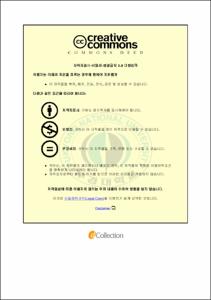감정노동행동이 직무만족에 미치는 영향-감성리더십과 임파워먼트의 조절효과
- Abstract
- This study is empirical analysis to subcategory of emotional labor which are surfacing acting (Basic Surface Acting and Challenged Surface Acting) and deep acting (Basic Deep Acting, Perspective Taking Deep Acting and Positive Refocus Deep Acting), Blau et al.(2010), influence boss's emotional leadership and member's empowerment as moderating variable on job satisfaction.
Service employees who work in Busan were conducted survey for verifying hypothesis as following.
First, analyzing emotional labor influence job satisfaction. Second, their superior's emotional leadership perform emotional labor on job satisfaction as moderating variable. Finally, member's empowerment is moderating effect whether or not.
Survey was done with detailed questionary it composed dependent variable and moderating variable for verifying research model.
Validity dependent variables and validity moderating variables was merged into one variable by factor analysis during verify hypothesis with 423 validity survey. Purpose of merging variable is influence of emotional labor depends on personality traits for superordinate concept such emotional leadership is more important than subcategory such as social competence. Frequency analysis, factor analysis, reliability analysis, correlation analysis, multiple regression analysis and moderated regression analysis was used above validity variable by SPSS 20.0 (Statistical Package for the Social Sciences 20.0).
The verification of hypothesis result are as following.
First, basic deep acting and positive refocus deep acting of emotional labor showed significant positive (+) effect on job satisfaction.
Second, boss's emotional leadership is moderating effect to basic deep acting and perspective taking deep acting of emotional labor on job satisfaction.
Third, member's empowerment is moderating effect to challenged surface acting, perspective taking deep acting and positive refocus deep acting of emotional leadership on job satisfaction.
In conclusion, job satisfaction is important for member of emotional labor. Furthermore boss's emotional leadership influence job satisfaction and member's empowerment also important factor to affect job satisfaction.
Leaders should understand and consider member's emotion to increase capacity of emotional labor through harmonious relationship. Member should find out themself customer's desire or what clients need because producing and consuming at same time and place. If service employee handle appropriate, duty and accomplishment are increased then job satisfaction is going up. Therefore employees have customer oriented attitude it is connected customer satisfaction. As a result, customer satisfaction contribute to profit of company and get one of competitiveness that is strategic human resource management.
- Issued Date
- 2014
- Awarded Date
- 2014. 8
- Type
- Dissertation
- Publisher
- 부경대학교
- Affiliation
- 경영대학원
- Department
- 경영대학원 경영학과경영학전공
- Advisor
- 류태모 교수님
- Table Of Contents
- 제1장 서 론
제1절 연구의 배경 및 목적
1. 연구의 배경.............................................................................................................1
2, 연구의 목적.............................................................................................................4
제2절 연구의 방법 및 논문의 구성
1. 연구의 방법.............................................................................................................5
2. 논문의 구성.............................................................................................................6
제2장 이론적 배경
제1절 서비스직의 감정노동행동
1. 감정노동행동 개념 ..............................................................................................7
2. 감정노동행동의 선행연구 ..................................................................................9
3. 감정노동행동의 구성요소 ................................................................................10
제2절 리더십의 개념과 감성리더십
1. 리더십의 개념과 감성리더십............................................................................13
2. 감성리더십의 선행연구 ....................................................................................18
3. 감성리더십의 구성요소 ....................................................................................19
제3절 임파워먼트
1. 임파워민트의 개념 .............................................................................................22
2. 임파워먼트의 선행연구 ....................................................................................25
3. 임파워먼트의 구성요소 ....................................................................................26
제4절 직무만족
1. 직무만족의 개념 .................................................................................................29
2. 직무만족의 선행연구 .........................................................................................31
3. 직무만족의 구성요소 .........................................................................................33
제3장 실증연구모형 및 가설
제1절 실증연구모형 .....................................................................................................34
제2절 연구가설 설정 ...................................................................................................35
제3절 변수의 조작적 정의 및 측정 .......................................................................38
제4절 설문지의 구성 ...................................................................................................39
제4장 실증분석의 결과
제1절 조사연구 방법
1. 자료수집 및 분석방법 ......................................................................................40
2. 표본의 인구통계학적 특성 ..............................................................................41
제2절 신뢰성 및 타당성 분석
1. 측정도구의 신뢰성 및 타당성 분석 ..............................................................43
2. 개념 간 판별타당성분석 ..................................................................................48
제3절 연구가설의 검증
1. 감정노동행동의 경험 정도와 직무만족의 관계검증...................................50
2. 감정노동행동과 직무만족의 관계에서 감성리더십의 조절효과검증.......52
3. 감성노동행동과 직무만족간의 관계에서 임파워먼트의 조절효과검증..54
제4절 가설 검증의 결과요약 ....................................................................................56
제5장 결론
제1절 연구결과 및 시사점 ........................................................................................59
제2절 연구의 한계 및 향후 연구방향 ..................................................................61
참고문헌 .................................................................................................................................62
설문지 ......................................................................................................................................69
Abstract .................................................................................................................................76
- Degree
- Master
- Appears in Collections:
- 경영대학원 > 경영학과-경영학전공
- Files in This Item:
-
-
Download
 감정노동행동이 직무만족에 미치는 영향-감성리더십과 임파워먼트의 조절효과.pdf
기타 데이터 / 756.06 kB / Adobe PDF
감정노동행동이 직무만족에 미치는 영향-감성리더십과 임파워먼트의 조절효과.pdf
기타 데이터 / 756.06 kB / Adobe PDF
-
Items in Repository are protected by copyright, with all rights reserved, unless otherwise indicated.